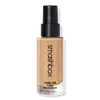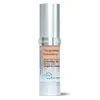What's inside
What's inside
 Key Ingredients
Key Ingredients

 Benefits
Benefits

 Concerns
Concerns

 Ingredients Side-by-side
Ingredients Side-by-side

Water
Skin ConditioningCyclopentasiloxane
EmollientTrimethylsiloxysilicate
EmollientTitanium Dioxide
Cosmetic ColorantButylene Glycol
HumectantTrimethyl Pentaphenyl Trisiloxane
EmollientSilica
AbrasivePhenyl Trimethicone
Skin ConditioningMagnesium Sulfate
Polyglyceryl-3 Diisostearate
EmulsifyingTribehenin
EmollientPEG-10 Dimethicone
Skin ConditioningBis-PEG/PPG-14/14 Dimethicone
EmollientTocopheryl Acetate
AntioxidantSodium Hyaluronate
HumectantGlycerin
HumectantEthylhexylglycerin
Skin ConditioningPolyglyceryl-4 Isostearate
EmulsifyingCetyl PEG/PPG-10/1 Dimethicone
EmulsifyingMethicone
EmollientTetramethyl Hexaphenyl Tetrasiloxane
Skin ConditioningPhenyl Methicone
EmollientDimethicone
EmollientLaureth-7
EmulsifyingPolymethylsilsesquioxane
Hexyl Laurate
EmollientDisteardimonium Hectorite
StabilisingCellulose Gum
Emulsion StabilisingPropylene Carbonate
SolventAlumina
AbrasiveXanthan Gum
EmulsifyingDimethicone Silylate
Sorbic Acid
PreservativePhenoxyethanol
PreservativeChlorphenesin
AntimicrobialIron Oxides
CI 77891
Cosmetic ColorantWater, Cyclopentasiloxane, Trimethylsiloxysilicate, Titanium Dioxide, Butylene Glycol, Trimethyl Pentaphenyl Trisiloxane, Silica, Phenyl Trimethicone, Magnesium Sulfate, Polyglyceryl-3 Diisostearate, Tribehenin, PEG-10 Dimethicone, Bis-PEG/PPG-14/14 Dimethicone, Tocopheryl Acetate, Sodium Hyaluronate, Glycerin, Ethylhexylglycerin, Polyglyceryl-4 Isostearate, Cetyl PEG/PPG-10/1 Dimethicone, Methicone, Tetramethyl Hexaphenyl Tetrasiloxane, Phenyl Methicone, Dimethicone, Laureth-7, Polymethylsilsesquioxane, Hexyl Laurate, Disteardimonium Hectorite, Cellulose Gum, Propylene Carbonate, Alumina, Xanthan Gum, Dimethicone Silylate, Sorbic Acid, Phenoxyethanol, Chlorphenesin, Iron Oxides, CI 77891
Aloe Barbadensis Sprout
HumectantIsododecane
EmollientTitanium Dioxide
Cosmetic ColorantMethicone
EmollientPolyglyceryl-4 Isostearate
EmulsifyingCetyl Dimethicone
EmollientHexyl Laurate
EmollientCyclopentasiloxane
EmollientPEG/PPG-20/15 Dimethicone
EmulsifyingSaccharomyces Cerevisiae Extract
Skin ConditioningPEG-8
HumectantDioctyldodecyl Dodecanedioate
EmollientIron Oxides
Vitis Vinifera Seed Extract
AntimicrobialGlycerin
HumectantO-Cymen-5-Ol
AntimicrobialSilica
AbrasiveCyclomethicone
EmollientDisteardimonium Hectorite
StabilisingPropylene Carbonate
SolventMaris Sal
Skin ConditioningDimethicone/Vinyl Dimethicone Crosspolymer
Skin ConditioningAloe Barbadensis Sprout, Isododecane, Titanium Dioxide, Methicone, Polyglyceryl-4 Isostearate, Cetyl Dimethicone, Hexyl Laurate, Cyclopentasiloxane, PEG/PPG-20/15 Dimethicone, Saccharomyces Cerevisiae Extract, PEG-8, Dioctyldodecyl Dodecanedioate, Iron Oxides, Vitis Vinifera Seed Extract, Glycerin, O-Cymen-5-Ol, Silica, Cyclomethicone, Disteardimonium Hectorite, Propylene Carbonate, Maris Sal, Dimethicone/Vinyl Dimethicone Crosspolymer
 Reviews
Reviews

Ingredients Explained
These ingredients are found in both products.
Ingredients higher up in an ingredient list are typically present in a larger amount.
Cyclopentasiloxane, or D5, is a silicone used to improve texture of products and trap moisture.
D5 is considered lightweight and volatile. Volatile means it evaporates quickly after application. Once evaporated, D5 leaves a thin barrier that helps keep skin hydrated.
It is also an emollient. Emollients help soften the skin and prevent water loss. Silicones create a silky texture in products. D5 helps other ingredients become more spreadable.
Studies show D5 is safe to use in skincare products. We recommend speaking with a skincare professional if you have concerns.
Learn more about CyclopentasiloxaneDisteardimonium Hectorite comes from the clay mineral named hectorite. It is used to add thickness to a product.
It can also help stabilize a product by helping to disperse other ingredients.
Hectorite is a rare, white clay mineral.
Learn more about Disteardimonium HectoriteGlycerin is already naturally found in your skin. It helps moisturize and protect your skin.
A study from 2016 found glycerin to be more effective as a humectant than AHAs and hyaluronic acid.
As a humectant, it helps the skin stay hydrated by pulling moisture to your skin. The low molecular weight of glycerin allows it to pull moisture into the deeper layers of your skin.
Hydrated skin improves your skin barrier; Your skin barrier helps protect against irritants and bacteria.
Glycerin has also been found to have antimicrobial and antiviral properties. Due to these properties, glycerin is often used in wound and burn treatments.
In cosmetics, glycerin is usually derived from plants such as soybean or palm. However, it can also be sourced from animals, such as tallow or animal fat.
This ingredient is organic, colorless, odorless, and non-toxic.
Glycerin is the name for this ingredient in American English. British English uses Glycerol/Glycerine.
Learn more about GlycerinHexyl Laurate isn't fungal acne safe.
Methicone is a type of silicone and is a simpler form of dimethicone.
Silicones are used to enhance the texture of products and have emollient properties. Methicone is used to give products a silky texture and improves spreadability.
This ingredient is an emulsifer and stabilizer. It comes from isostearic acid and polyglycerin.
As an emulsifier, it helps blend oil and water to improve texture, spreadbility, and application.
Due to it being derived from isostearic acid, this ingredient may not be fungal acne safe.
Learn more about Polyglyceryl-4 IsostearateThis ingredient is a solvent. It helps dissolve active ingredients and alter the texture of products.
Propylene Carbonate is commonly used in makeup and with clay, such as montmorillonite or bentonite.
Studies show this ingredient to be safe for cosmetics. When it is undiluted, it can cause skin irritation. (It is always diluted in skincare and makeup). This ingredient is water-soluble.
Propylene Carbonate is created from propylene glycol and carbonic acid.
Learn more about Propylene CarbonateSilica, also known as silicon dioxide, is a naturally occurring mineral. It is used as a fine, spherical, and porous powder in cosmetics.
Though it has exfoliant properties, the function of silica varies depending on the product.
The unique structure of silica enhances the spreadability and adds smoothness, making it a great texture enhancer.
It is also used as an active carrier, emulsifier, and mattifier due to its ability to absorb excess oil.
In some products, tiny microneedles called spicules are made from silica or hydrolyzed sponge. When you rub them in, they lightly polish away dead skin layers and enhance the penetration of active ingredients.
Learn more about SilicaTitanium dioxide is a mineral UV filter widely used in sunscreens and cosmetics.
It is one of only two UV filters officially classified as “mineral” by regulatory agencies, the other being zinc oxide.
Titanium dioxide provides broad-spectrum protection mostly in the UVB and UVAII range, with some protection in the UVAI range.
While its UVA protection isn’t as strong as zinc oxide’s, the difference is minor.
A common myth is that mineral UV filters reflect UV light. However, modern research shows titanium dioxide absorbs UV radiation like chemical filters (~95% absorption & 5% reflection).
Thanks to its non-irritating nature, titanium dioxide is suitable for sensitive, acne-prone, or redness-prone skin. It is unlikely to cause "eye sting" like other sunscreen ingredients.
A major drawback of this ingredient is its white cast and thick texture. This is why mineral sunscreens often leave a white cast and are less cosmetically elegant than chemical/hybrid sunscreens.
To improve white cast and spreadability, micronized or nano-sized titanium dioxide is often used.
There are ongoing concerns surrounding nano-titanium oxide's impact on marine ecosystems.
There is no conclusive evidence that any form of titanium oxide (or any other sunscreen ingredients) will cause harm to marine ecosystems or coral reefs. The science is still developing but many consumers are keeping a close eye on this issue.
Please note, many destinations have reef-safety sunscreen rules. For instance, the U.S. Virgin Islands advises all visitors to use non-nano mineral sunscreens.
Nano mineral sunscreens once raised safety concerns about absorption into skin.
Extensive research has shown that they do not penetrate healthy or damaged skin; they remain safely on the surface and the top layer of dead skin (stratum corneum).
You'll likely find titanium dioxide bundled with alumina, silica, or dimethicone. These ingredients help make titanium dioxide highly photostable; this prevents it from interacting with other formula components under UV light.
Learn more about Titanium DioxideThis ingredient is a combination of red, black, and yellow iron oxide pigments. This combination of colors is usually found in foundation, because it results in a "skin" color.